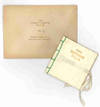
Dwight D. Eisenhower’s Vision For America’s Future: The U.S. should act to defend Democracy abroad, so that each nation’s political system would be “an honest expression of purpose” of its people
- Used
- Signed
- Condition
- See description
- Seller
-
Ardmore, Pennsylvania, United States
Payment Methods Accepted
About This Item
At home, he advises Americans to cultivate “self-dependence, self-reliance, moral and physical courage and patriotism”, and spurn materialism
He demands honesty, hated hypocrisy, and would not tolerate lip service: “I do not mean to preach about them; rather to practice them”
The American generation in leadership roles in the 1950s and 1960s had lived through the turmoil and vast destruction of World War I, but been told the sacrifices were worth it, as the war would make the world safe for American-style democracy. Just a decade after that war ended, the nation was plunged into the Great Depression, when a quarter of the people were unemployed and another quarter under-employed. Even as the U.S. struggled to get through the Depression, news was flooding in from Europe documenting the rise of the dictators. Americans saw the European democracies adopt policies of appeasement towards Hitler and Mussolini, assuming they could buy peace by giving the dictators everything they wanted. And yet with every victory of the dictators, a general conflagration seemed to get closer, not farther away. Americans asserted their unwillingness to get involved in these European quarrels, hoping to avoid war through isolationism. Then on September 1, 1939, Hitler invaded Poland and World War II came to Europe. The lesson learned by this generation was that appeasement leads to disaster, and will result in the loss of one nation after another. On December 7, 1941, the U.S. was dragged into the war when the Japanese attacked Pearl Harbor. The lesson learned was that isolationism was a tactic that led to failure. Some 80 million people were casualties in World War II, and every American saw the concentration camps in newsreels when they went to the movies. The third lesson learned was that failure to act on time to meet a threat could have devastating consequences.
The leader of the older contingent in this leadership generation was Dwight D. Eisenhower, who led the Allies to victory in World War II and then served as President of the United States from 1953-1961. His predecessor, Harry Truman, was also part of that generation. Truman’s terms saw the alliance with the Soviet Union break down, and the Soviets impose Communism throughout Eastern Europe and China. The people in those countries had no vote nor any choice in the matter; the Russians sent in tanks to enforce their system. The Cold War broke out, as American leaders sought to apply the lessons of World War II to halt the expansion of Communism. Thus the Korean War.
As President, Eisenhower was faced with preventing the further spread of Communism; and applying the lessons learned, that meant standing up to the Communist menace, and not allowing the Soviets or their Chinese client state to take one country after another. The idea that this would happen is known as the domino theory. But Ike was a man of high character, and he tempered this firmness with a deep sense of morality. He would not go off half-cocked and he was not trigger-happy. He made peace in Korea five months after taking office, and despite pressure avoided involving the U.S. in any war thereafter. Moreover, Ike was pretty successful in preventing any more dominos from falling, though there were a few places in which Russian or Chinese-supported local forces were battling it out with anti-Communists, the foremost being Vietnam. Then in 1961 Ike and indeed his elder contingent began to turn over control to the younger contingent, one that would be led by John F. Kennedy, Lyndon B. Johnson, and Richard Nixon. In power these latter men saw Vietnam as a domino that had to be kept from falling, and Eisenhower, applying his lessons learned and now out of power, tended to agree with them.
Eisenhower believed that there were moral qualities that made a nation - or an individual - successful, and from time to time he wrote and spoke on these. But more than that, he acted them out in his real life - he practiced what he preached. These included courage, intelligent enquiry, self-reliance, selflessness and self-sacrifice, dedication and humility. These qualities were crucial to him, and he pondered long and hard about what they meant.
Typed letter signed, on his personal letterhead, Gettysburg Pennsylvania, September 12, 1966, to Paul J. Nowland of Wilmington, Delaware, who was a noted investment banker and veteran of World War I. Written towards the end of his life, Ike had had over five years since leaving the presidency to contemplate the state of the world - and the U.S. And in those final years he also reflected on what qualities the nation would have to cultivate in order to be successful and remain a beacon of hope. In this letter he placed those reflections, and framed advise for Americans to take forward into an unknown future.
“How I wish that I could give a prophecy as to our country’s future, near and distant. Vietnam is only one of our problems, whether we look outward on the world or inward toward the United States itself. I think we have never been in a nastier war situation than the one we have now in Southeast Asia. However, I cannot see how America can haul down its flag in the face of the announced Communist purpose of achieving world domination. I think that what we must hope for is a sufficiently clear-cut military victory so as to permit an honest expression of purpose on the part of the South Vietnamese people and to help them establish a virile system of self-government. My position is that once America abandons her position as a leader of all those people who want the blessing of liberty then we will be starting backward.
“Domestically I think we are not sufficiently concerned with spiritual and intellectual standards as we are with the material standards. I realize that a human being must be able to satisfy his body’s needs before he can make any progress culturally. One of the effects of the programs that so occupy us today is to weaken those qualities of self-dependence, self-reliance, moral and physical courage and patriotism. So, I think that what we need is to strengthen these qualities in the home, at school and in the churches. I do not mean to preach about them; rather to practice them.
“This is a very sketchy and hazy answer to your question but you have raised a question to which the answer could occupy an entire book.”
We see now that Eisenhower placed too much importance on the necessity of a win in Vietnam. But his plea that the U.S. continue to support the self- government of peoples is as lively and important advise today as when he gave it. And his clarion call for Americans to maintain the highest moral, spiritual and intellectual standards, to spurn materialism, and to avoid hypocrisy, is superb advice that will always be current. This is undoubtedly the most important statement of Eisenhower on national qualities and goals that we can ever recall seeing, and provides an insight into why he was so popular in his time.
Reviews
(Log in or Create an Account first!)
Details
- Bookseller
- The Raab Collection
(US)
- Bookseller's Inventory #
- 17198
- Title
- Dwight D. Eisenhower’s Vision For America’s Future
- Book Condition
- Used
- Date Published
- 12/9/66
Terms of Sale
The Raab Collection
10 day return guarantee, with full refund excluding shipping costs for up to 10 days after delivery if an item is returned in original condition
About the Seller
The Raab Collection
About The Raab Collection
Glossary
Some terminology that may be used in this description includes:

